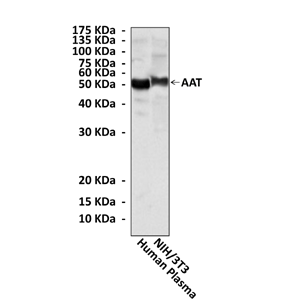Anti-AAT: Mouse alpha-1-Antitrypsin Antibody |
 |
BACKGROUND Alpha-1-proteinase inhibitor (alpha1-PI) also known as alpha-1-antitrypsin (AAT) is the most abundant serine protease inhibitor (SERPIN) in human plasma and other mammalians. AAT inhibits broad spectrum of serine proteases and its main physiological role is to inhibit neutrophil elastase in lungs to protect pulmonary tissues from excessive damage.1 In humans, AAT protein is encoded by gene located at chromosome 14q32.1 and the precursor protein consists of 418 amino acid residues, including 24-amino acid hydrophobic signal peptide. The mature monomeric AAT is a glycoprotein of 394 amino acids with three N-linked bi-antennary and tri-antennary carbohydrate moieties attached to asparagine residues at 46, 83 and 247 position resulting into overall molecular weight of 52 kDa.2
AAT deficiency is an inherited autosomal co-dominant disorder, for which more than 100 alleles have been identified. AAT alleles are categorized into four groups- normal, deficient, null and dysfunctional. Normal alleles are typified by AAT concentration of 20-53 mM and deficient alleles lead to AAT concentrations typically<15 mM. Deficient subjects are prone to lung or liver diseases, while those carrying null alleles are prone only to lung diseases. Serum deficiency or absence of AAT occurs because of alterations, in gene expression or translation, or abnormal intercellular processing. Dysfunctional alleles code for an abnormal form of AAT, which exist in a detectable level but does not function normally. The majority of AAT associated clinical diseases are due to deficiency and null alleles. The level of serum AAT was found to be excessively low in adult patients having acute clinical symptoms of ventral hernia and cholelithiasis.3 This reflects the fluctuating pattern of AAT concentration in serum of normal adults with acute clinical symptoms.
REFERENCES
1. Gettins, P.G.: Chem. Rev. 102:4751-4804, 2002
2. Kolarich, D. et al: Proteomics 6:3369-80, 2006
3. Coakley, R.J. et al: Am. J. Med. Sci. 321:33-41, 2001
2. Kolarich, D. et al: Proteomics 6:3369-80, 2006
3. Coakley, R.J. et al: Am. J. Med. Sci. 321:33-41, 2001
Products are for research use only. They are not intended for human, animal, or diagnostic applications.
Параметры
Cat.No.: | CP10002 |
Antigen: | Recombinant human AAT proteins expressed in E. coli. |
Isotype: | Mouse IgG |
Species & predicted species cross- reactivity ( ): | Human, Mouse |
Applications & Suggested starting dilutions:* | WB 1:1000 IP 1:50 IHC n/d ICC n/d FACS n/d |
Predicted Molecular Weight of protein: | 52 kDa |
Specificity/Sensitivity: | Detects endogenous levels of AAT proteins without cross-reactivity with other related proteins. |
Storage: | Store at -20°C, 4°C for frequent use. Avoid repeated freeze-thaw cycles. |
*Optimal working dilutions must be determined by end user.
Документы
Информация представлена исключительно в ознакомительных целях и ни при каких условиях не является публичной офертой








